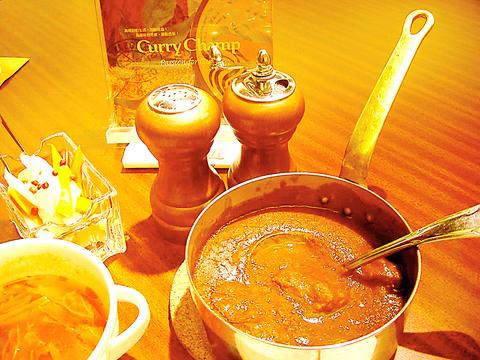Curry may have started out in India hundreds of years ago. It certainly traveled throughout Asia, stopping at Sri Lanka, Indonesia, Thailand and Vietnam, where regional flavors were created. But when this cuisine finally reached Japan in the 1950s, it underwent a metamorphosis as the Japanese endeavored to develop new flavors catering specifically to their own habits and tastes. The result was restaurants specializing in curry cuisine, a big food industry producing pre-made curry sauces and even the institution of Curry Day, when school students all have curry for lunch.
Shih Yeh (欣葉), the 25-year-old restaurant group behind Curry Champ was originally just a single restaurant in Taipei's Combat Zone. In recent years, it has expanded its business to Japanese cuisine, and most recently, to Japanese-style curry.
The curry at Curry Champ is notable for its rich and smooth texture. The reason: the large quantities of onion, fruit and vegetables used to make the sauce. Chef Motoe Doi, who has been brought in from Japan to help establish the restaurant, has 45 years of experience making curry. His emphasis is on the quality of ingredients and on the cooking process.

PHOTO: YU SEN-LUN, TAIPEI TIMES
The onions, which form the base of the sauce, are 11-month-old bulbs from Ilan. They are cooked to a puree and then combined with dill, cumin, clove, tarragon, thyme, pepper, chili and many other spices. The puree is cooked with apples, carrots, celery, tomato and bananas, to which a chicken broth is added. With such "fruitful" ingredients, there is no need for any artificial flavorings.
A set menu includes a small pot of curry, a plate of rice topped with almond chips, a small plate of pickles as well as soup, salad and dessert. It may look small and simple, but it's a substantial meal. According to Doi, exact proportions should be observed between rice and curry to ensure a satisfying meal. And as for the rice itself, each grain should be slightly chewy.
Passion curry, one of Curry Champ's original recipes, has a straightforward flavor. It has a slightly sour taste from the homemade yogurt that is added. Opium curry, also a Curry Champ original, has a more subtle flavor, so that it tastes sweet in the mouth, but has a bite that comes later. The effect is created by the use of chocolate sauce in the gravy. With each flavor of sauce there is a choice of beef, chicken, vegetable or seafood. You can also ask staff to adjust the spiciness to your taste.
Another recommendation is the seafood grill curry. The rice is first stir-fried in curry sauce and placed in layers with shrimp, scallops, big clams, and then grilled with Mozzarella cheese. This unusual combination is surprisingly tasty.

On April 26, The Lancet published a letter from two doctors at Taichung-based China Medical University Hospital (CMUH) warning that “Taiwan’s Health Care System is on the Brink of Collapse.” The authors said that “Years of policy inaction and mismanagement of resources have led to the National Health Insurance system operating under unsustainable conditions.” The pushback was immediate. Errors in the paper were quickly identified and publicized, to discredit the authors (the hospital apologized). CNA reported that CMUH said the letter described Taiwan in 2021 as having 62 nurses per 10,000 people, when the correct number was 78 nurses per 10,000

As we live longer, our risk of cognitive impairment is increasing. How can we delay the onset of symptoms? Do we have to give up every indulgence or can small changes make a difference? We asked neurologists for tips on how to keep our brains healthy for life. TAKE CARE OF YOUR HEALTH “All of the sensible things that apply to bodily health apply to brain health,” says Suzanne O’Sullivan, a consultant in neurology at the National Hospital for Neurology and Neurosurgery in London, and the author of The Age of Diagnosis. “When you’re 20, you can get away with absolute

May 5 to May 11 What started out as friction between Taiwanese students at Taichung First High School and a Japanese head cook escalated dramatically over the first two weeks of May 1927. It began on April 30 when the cook’s wife knew that lotus starch used in that night’s dinner had rat feces in it, but failed to inform staff until the meal was already prepared. The students believed that her silence was intentional, and filed a complaint. The school’s Japanese administrators sided with the cook’s family, dismissing the students as troublemakers and clamping down on their freedoms — with

As Donald Trump’s executive order in March led to the shuttering of Voice of America (VOA) — the global broadcaster whose roots date back to the fight against Nazi propaganda — he quickly attracted support from figures not used to aligning themselves with any US administration. Trump had ordered the US Agency for Global Media, the federal agency that funds VOA and other groups promoting independent journalism overseas, to be “eliminated to the maximum extent consistent with applicable law.” The decision suddenly halted programming in 49 languages to more than 425 million people. In Moscow, Margarita Simonyan, the hardline editor-in-chief of the